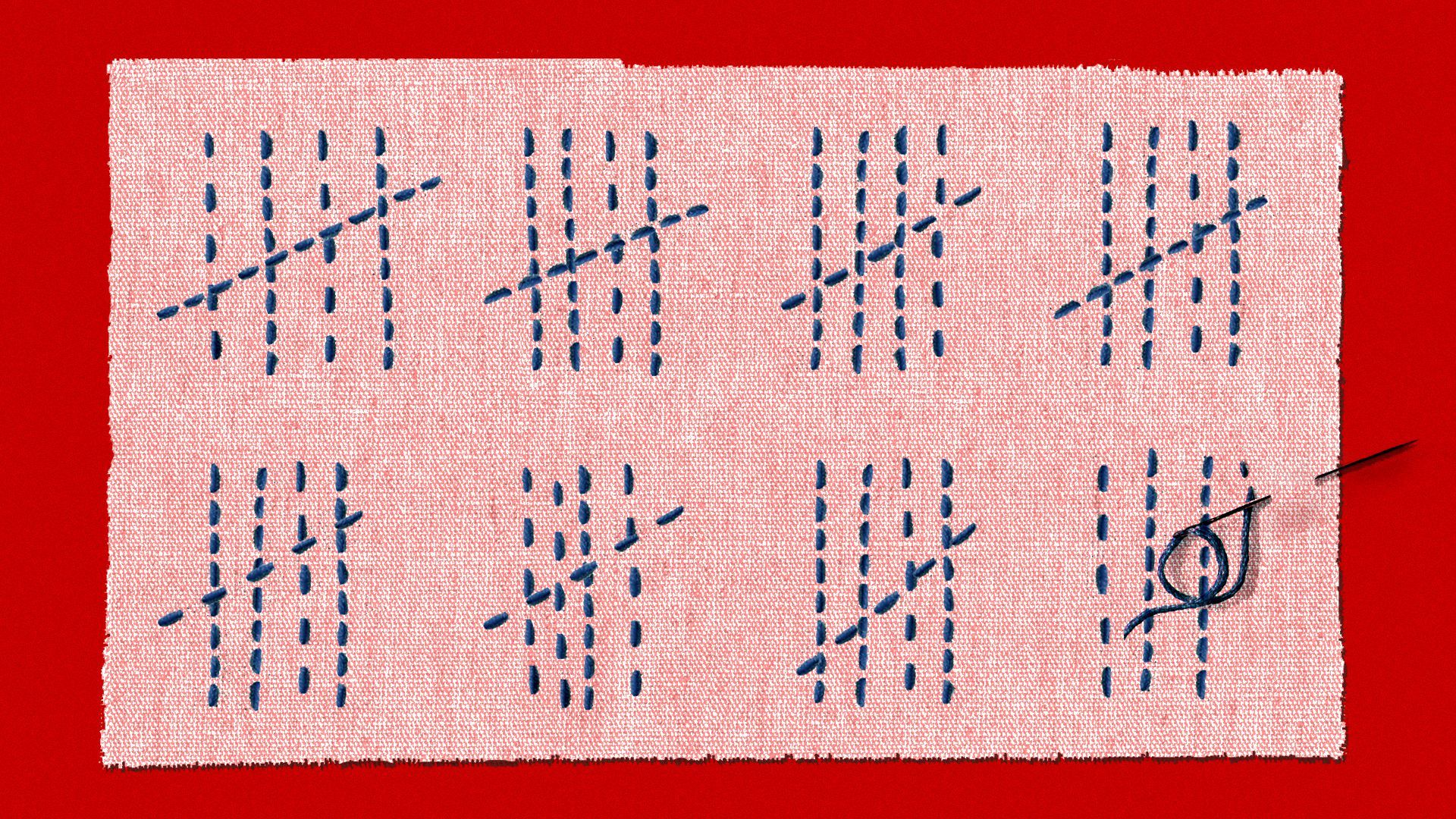Global textile watchdogs struggled to raise alarms in Xinjiang
Add Axios as your preferred source to
see more of our stories on Google.

Illustration: Annelise Capossela/Axios
The world has learned of China's sweeping system of forced labor in the Xinjiang garment industry not through fair trade organizations but through independent researchers, journalists and the testimonies of former detainees.
Why it matters: This is just one symptom of a bigger problem — the failure of many international institutions and governments to forcefully push back against the Chinese Communist Party's human rights violations.
Global nonprofits dedicated to promoting ethical textile production were not among those to raise the early alarm about forced labor in Xinjiang's cotton fields.
- But the problem runs deeper. Just over a year ago, at least two textile and fiber watchdogs faced scrutiny for their links to the Xinjiang Production and Construction Corps (XPCC), a quasi-military organization that the U.S. government sanctioned in 2020 due to its role in operating mass internment camps and using forced labor in cotton fields.
- Though the U.S. only sanctioned the XPCC in 2020, regional experts have known of its complicity in abusive farming practices for years.
Details: Until October 2019, the Better Cotton Initiative, a major international cotton sustainability organization, had an XPCC affiliate as one of its official implementing partners, according to an investigation by trade publication Apparel Insider.
- In March 2020, BCI suspended operations in Xinjiang, then in October, it announced it was pulling out of Xinjiang entirely.
- In a statement, BCI said it was enacting a policy of "responsible disengagement" after determining there was no way to engage ethically in Xinjiang.
Textile Exchange, a U.S.-based nonprofit promoting ethical textile production, also faced criticism after Apparel Insider revealed in December 2019 that the XPCC Cotton Association's director, YickChung Man, was a member of the Textile Exchange board.
- "It is reprehensible that a leading member of the XPCC would be given a leadership role in one of the organizations that sets the international standards for the global textile industry," Darren Byler, an expert on Uighur culture and society who teaches at the University of Washington, told Axios.
- Man is no longer listed as a board member. A statement on the Textile Exchange website says he has retired.
- In August 2020, Textile Exchange posted a statement on its website saying it was "concerned and disturbed" about reports of forced labor in the Xinjiang cotton industry.
Context: In countries where forced labor is a major concern, there are often other systemic problems such as corruption, lack of transparency and weak rule of law that make enforcement of international labor standards difficult.
- That's why having domestic partners who are familiar with local conditions and who can help with onsite audits are vital to labor certification programs.
But China presents a unique problem. Local government partners may be complicit in the forced labor schemes, and individual officials who might personally object to such practices could face punishment for revealing details to outsiders.
- Extremely tight information control means local partners based in China but not in Xinjiang might not even be aware of what is happening.
- “The classic method for combating forced labor relies on careful audits of global supply chains," Adrian Zenz, a leading expert on forced labor in Xinjiang, wrote in Foreign Policy. "In Xinjiang, this approach runs into a severe limitation: Conducting such audits in the world’s most sophisticated digital police state is impossible.”
The bottom line: The textile industry hasn't stayed on top of the quick downward spiral in Xinjiang, says Zenz. And now they don't know how to extricate themselves.
Go deeper: Subsidiary of world's largest shirtmaker put on U.S. blacklist over Xinjiang ties
